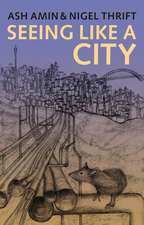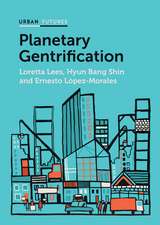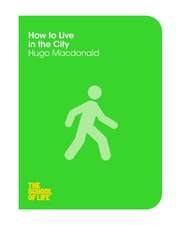Phoenix cities – The fall and rise of great indust rial cities: CASE Studies on Poverty, Place and Policy
Autor Anne Poweren Limba Engleză Paperback – 15 mar 2010
'Weak market cities' across European and America, or 'core cities' as they were in their heyday, went from being 'industrial giants' dominating their national, and eventually the global, economy, to being 'devastation zones'. In a single generation three quarters of all manufacturing jobs disappeared, leaving dislocated, impoverished communities, run down city centres and a massive population exodus.So how did Europeans react? And how different was their response from America's? This book looks closely at the recovery trajectories of seven European cities from very different regions of the EU. Their dramatic decline, intense recovery efforts and actual progress on the ground underline the significance of public underpinning in times of crisis. Innovative enterprises, new-style city leadership, special neighbourhood programmes and skills development are all explored. The American experience, where cities were largely left 'to their own devices', produced a slower, more uncertain recovery trajectory. This book will provide much that is original and promising to all those wanting to understand the ground-level realities of urban change and progress.
Din seria CASE Studies on Poverty, Place and Policy
-
 Preț: 332.39 lei
Preț: 332.39 lei -
 Preț: 328.02 lei
Preț: 328.02 lei -
 Preț: 350.52 lei
Preț: 350.52 lei -
 Preț: 331.33 lei
Preț: 331.33 lei -
 Preț: 329.41 lei
Preț: 329.41 lei -
 Preț: 334.62 lei
Preț: 334.62 lei -
 Preț: 331.33 lei
Preț: 331.33 lei -
 Preț: 321.71 lei
Preț: 321.71 lei -
 Preț: 370.23 lei
Preț: 370.23 lei - 23%
 Preț: 778.12 lei
Preț: 778.12 lei -
 Preț: 280.18 lei
Preț: 280.18 lei
Preț: 502.16 lei
Nou
Puncte Express: 753
Preț estimativ în valută:
96.09€ • 100.59$ • 79.51£
96.09€ • 100.59$ • 79.51£
Carte tipărită la comandă
Livrare economică 05-19 aprilie
Preluare comenzi: 021 569.72.76
Specificații
ISBN-13: 9781847426833
ISBN-10: 1847426832
Pagini: 432
Dimensiuni: 172 x 239 x 20 mm
Greutate: 0.82 kg
Editura: Bristol University Press
Seria CASE Studies on Poverty, Place and Policy
ISBN-10: 1847426832
Pagini: 432
Dimensiuni: 172 x 239 x 20 mm
Greutate: 0.82 kg
Editura: Bristol University Press
Seria CASE Studies on Poverty, Place and Policy
Recenzii
It is vital that urban policy makers learn the right lessons from past failures - and past successes. This new book is a rich source for anyone who cares about the future of cities. Howard Davies, Director, London School of Economics and Political Science
As we embark on a new era of urbanism, based on resilience, equity andsustainability, there's so much to learn from these 'boom, bust and recover' case studies. A hugely insightful piece of work. Jonathon Porritt, Founder Director, Forum for the Future
Post-industrial cities have much in common across Europe, in both old and new member states. For this reason I am struck by five key ideas in Phoenix Cities: The timescale needed for these cities to recover is long - a whole generation:many different interventions are needed - land use, environment, social inclusion, citizen participation and responsive projects all contribute to recovery: interventions must fit together, requiring a strategic perspective and decision-making structure that guarantee the continuity of delivery for the duration:new skills are vital to people returning to employment after the collapse of traditional jobs: finally, in the 'European model' of urban recovery, public investment plays a decisive role in the renewed take-off of these cities. Sylvie Harburger, Caisse de Depôts
With the Great Recession, America's older industrial metros are indesperate need for a recovery playbook. The European lessons offered inPhoenix Cities are timely, practical, do-able and inspiring. Bruce Katz, Vice President, Brookings Metropolitan Policy Program
...this work is a scholarly and accessible exploration of the rise and fall of industrial cities, and provides useful hints on the history and future of recovery. Neil McInroy in New Start Magazine
Notă biografică
Anne Power, CASE, London School of Economics and Political Science, Jörg Plöger, ILS - Research Institute for Regional and Urban Development and Astrid Winkler, CASE, London School of Economics and Political Science
Cuprins
Part one: The tale of seven cities
Introduction: what are weak market cities?
Industrial giants: emerging on the back of history
A change in direction: political turmoil and a ferment of new ideas
Neighbourhood interventions: can small scale make a difference in big cities?
Part two: Learning from 50 years of boom and bust: seven European case studies
Introduction
Leipzig
Bremen
Sheffield
Belfast
Bilbao
Torino
Saint-Étienne
Part three: Are weak market cities recovering or struggling?
Towards a recovery framework
Part four: What can European cities learn from the American experience of urban industrial decline and post-industrial recovery initiatives?
How do American weak market cities compare with Europe?
Will American cities recover?
What are the lessons for Europe?
Part five: Conclusions
What do European cities teach us?
Where does the future lie?
Introduction: what are weak market cities?
Industrial giants: emerging on the back of history
A change in direction: political turmoil and a ferment of new ideas
Neighbourhood interventions: can small scale make a difference in big cities?
Part two: Learning from 50 years of boom and bust: seven European case studies
Introduction
Leipzig
Bremen
Sheffield
Belfast
Bilbao
Torino
Saint-Étienne
Part three: Are weak market cities recovering or struggling?
Towards a recovery framework
Part four: What can European cities learn from the American experience of urban industrial decline and post-industrial recovery initiatives?
How do American weak market cities compare with Europe?
Will American cities recover?
What are the lessons for Europe?
Part five: Conclusions
What do European cities teach us?
Where does the future lie?














